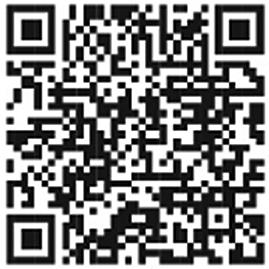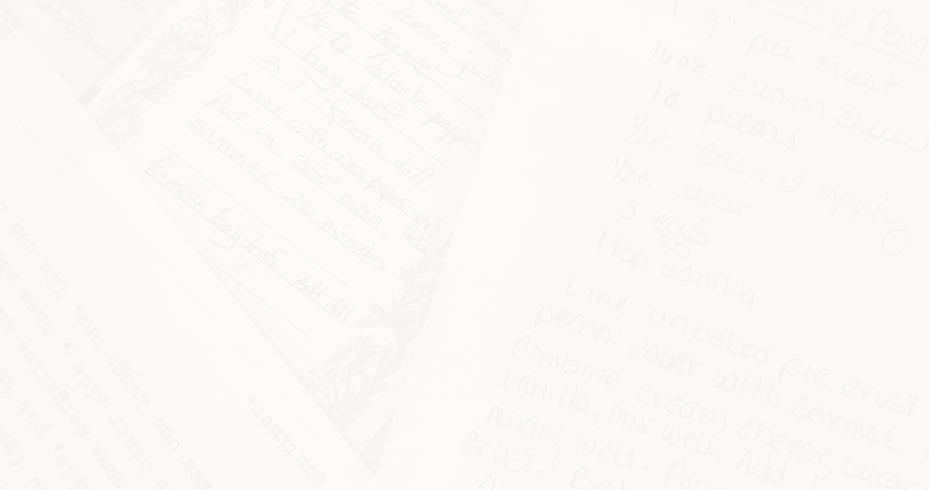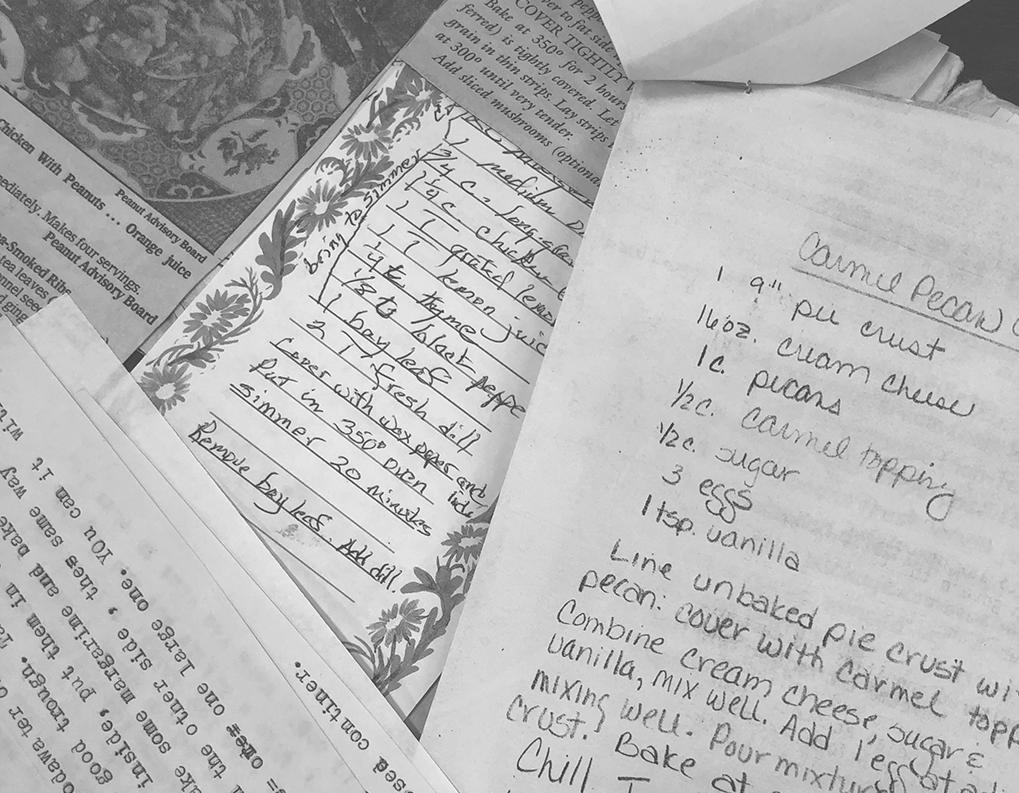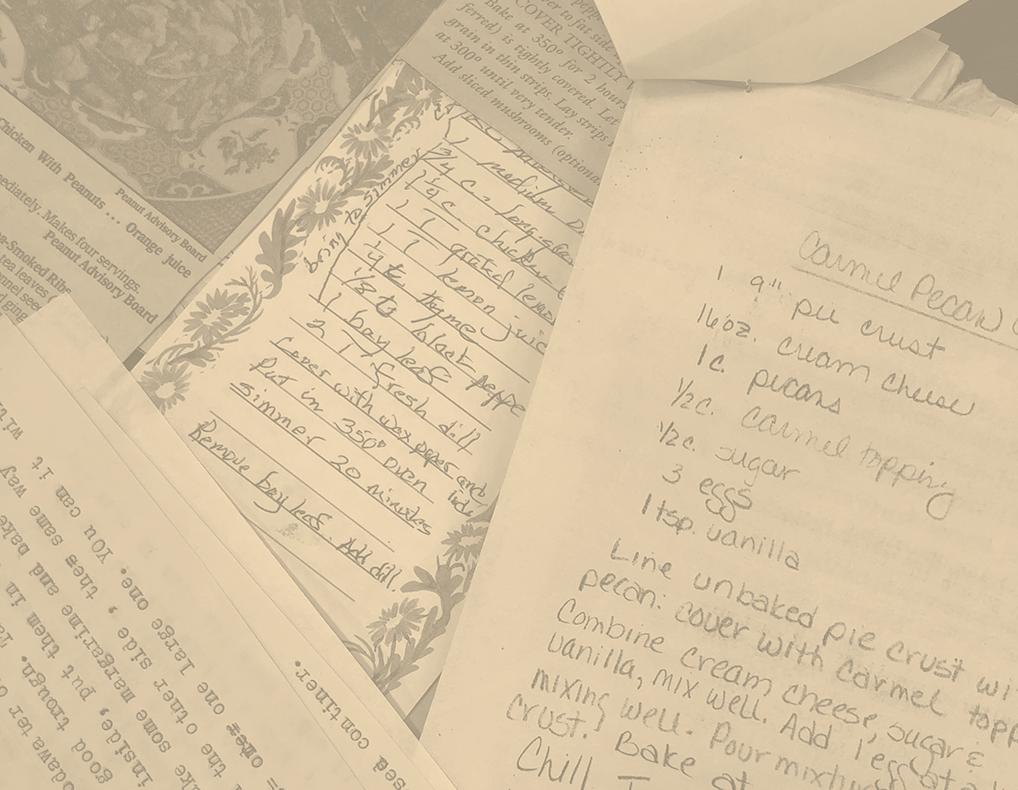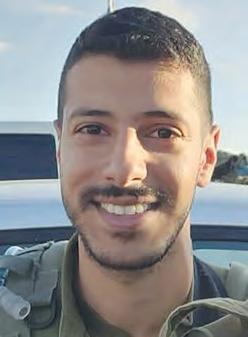

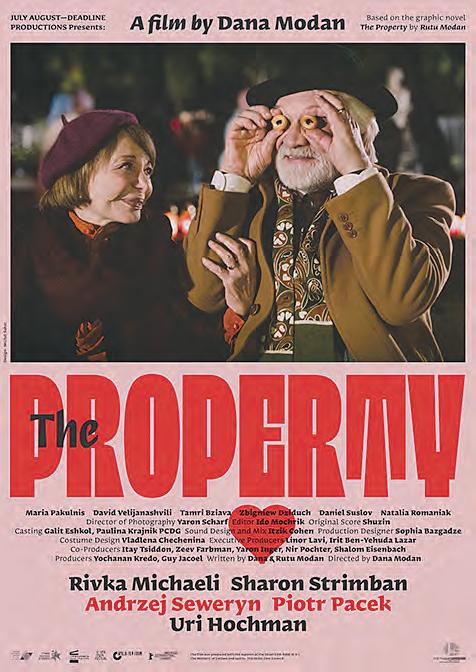






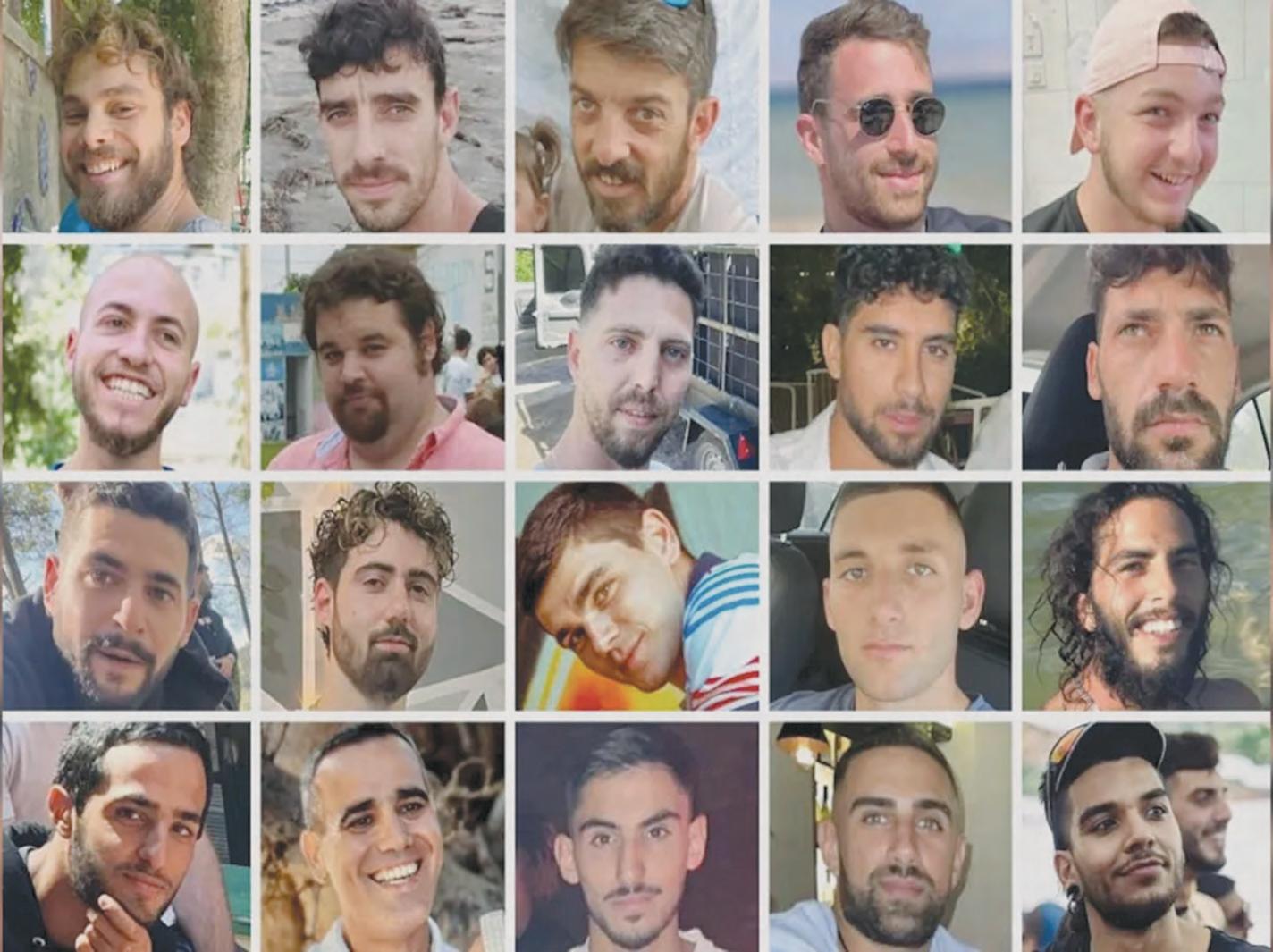
PHILISSA CRAMER
The last time Israel and Hamas struck a ceasefire in their war, in early 2025, 38 hostages were released — almost all of them living.
Since then, Israel has retrieved the bodies of nine other hostages taken during Hamas’ Oct. 7, 2023, attack on Israel, while U.S. President Donald Trump negotiated the release of Edan Alexander, a soldier who had been the last living American-Israeli in Gaza. The remains of some deceased hostages were retrieved during fighting, and officials conveyed that another two hostages who had not been confirmed dead were in fact no longer living.
That leaves 20 living hostages — all young men — and 28 deceased ones set to be released now under the terms of a ceasefire deal struck by Israel and Hamas.
These are the remaining hostages known to be alive and what we know about them:
Matan Angrest: Angrest, 22, was serving as a soldier on Oct. 7 and was seized from his burning tank at Kibbutz Nahal Oz. Released hostages disclosed that he was chained and beaten in captivity and suffered severe injuries. He appeared in one video released by Hamas in July 2024 and another in July 2025, as momentum was building toward a potential deal.
Gali Berman: Berman, 27, was kidnapped from his home on Kibbutz Kfar Aza. A relative said they had received a sign of life for both brothers — the only remaining living hostages from their ravaged kibbutz — during the ceasefire in early 2025.
Ziv Berman: Like his twin brother Gali, Ziv, 27, was kidnapped from his home on Kibbutz Kfar Aza. A sign of life was also received for him in February 2025, but officials indicated that the two brothers were being held separately.
Elkana Bohbot: Abducted from the Nova music festival, Bohbot, 36, was filmed being beaten before he was taken to Gaza. His family — which includes a young son — received the first sign of life for Bohbot during the ceasefire earlier this
year. His parents said he expressed hope, through a freed hostage, that they are continuing to hold a market stall where he planned to open an ice cream shop; they are.
Rom Braslavski: Braslavski, 21, was abducted while working as a security guard at the Nova music festival during a break in his army service. His family had received no sign of life until March 2025, when a released hostage said he had formed a friendship with Braslavski in Gaza. Hamas released a video featuring Braslavski in April 2025.
Nimrod Cohen: Cohen, 20, was captured from a tank on his base near the Gaza border. His family received both a message from Nimrod through a released hostage — “I’m OK, don’t worry, I love you,” they said he said — as well as visual evidence of his state. Though his face was obscured in a video Hamas released showing hostages bidding farewell to Yair Horn, who was freed in the first phase of the ceasefire, his parents recognized Nimrod’s tattoo.
Ariel Cunio: Taken hostage with his girlfriend from Kibbutz Nir Oz, Cunio, 28, is half of one of multiple sibling pairs who remain in Gaza. His mother said in August 2024 that she had gotten a sign of life from him and his brother. His partner Arbel Yehud was released in January after being held without any contact with other Israelis for nearly 500 days.
David Cunio: Cunio, the brother of Ariel Cunio, 35, was taken hostage from his home along with his wife, their twin daughters, his sister-in-law and her daughter. All were released in November 2023 except for him. After the August 2024 sign of life, his wife said the family received another in February 2025. “David is alive,” Sharon Aloni Cunio told Channel 12 news. “And that gives us so much strength and so much air to breathe.” His daughters turned 5 in July 2025.
Evyatar David: David, 24, was taken hostage at the Nova music festival along with his best friend, Guy Gilboa-Dalal. A sign of life came for him in February 2025 when Hamas brought him to view other hostages being released.
Guy Gilboa-Dalal: Gilboa-Dalal, 24, was taken hostage at the Nova music festival along with his best friend, Evyatar David. He appeared alongside David in the video released by Hamas of the pair watching other hostages be released and realizing that they would not be.
See Welcome Home page 3
JEN GOODMAN
JFO Foundation Administrator
Former Omahans Albert, of blessed memory, and Eleanor Feldman established the Albert and Eleanor Feldman Family Israel Foundation at the Jewish Federation of Omaha Foundation in 2018. Though Al and Eleanor relocated to California over two decades ago, they continued to consider Omaha their home. In a lasting tribute to their Jewish community, they created this Foundation to support and strengthen the bond between Omaha and Israel. Their daughters, Lori Feldman and Jodi Fleishman, now oversee the Foundation’s operations. Lori shared, “The goal of the Foundation is to enhance the
Spirit. Hashayara—meaning “convoy” in Hebrew—is a group of Israeli musicians who perform beloved Israeli songs from across the decades, often blending them with familiar English hits. The band members are experienced Dror Israel educators who have worked extensively with children, teens, and adults. Since the outbreak of the war on Oct. 7th, Hashayara has performed more than 120 concerts across Israel, reaching a wide range of audiences, from evacuated families and affected northern communities to IDF soldiers.
Now touring North American Jewish communities as part of the Oct. 7th commemorative events, Hashayara brought its energy and spirit to Omaha. Their visit included several performances: the Community Campaign Kickoff, which drew more than 250 guests, as well as special interactive sessions with toddlers, grade school students, and seniors.
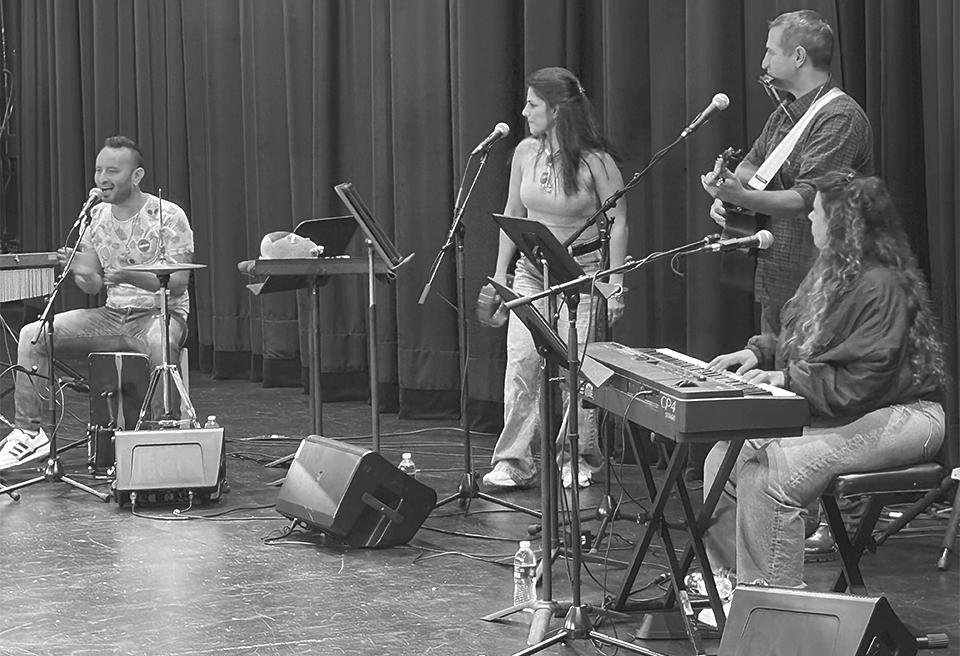
relationship between the Omaha Jewish community and Israel. Since our parents started the Foundation, it has granted more than $500,000 to help community members travel to Israel and make Aliyah, and to support enrichment programs in the arts, music, and education for both children and adults in Omaha. Our father’s greatest hope was to inspire others with his deep love for Israel. Through the Foundation, we are proud to carry forward that legacy.”
The Foundation supports a broad range of Israel-related programs through funding and subsidies. These include travel to Israel, Aliyah assistance, cultural exchanges, and artist collaborations between Omaha and Israel. It also funds the Shlichim program, youth camp exchanges, Partnership2Gether, and synagogue programming that celebrates Israel’s culture and heritage. “Our father would be deeply touched to see the difference the Foundation makes and the meaningful programs it helps bring to life,” added Jodi. This fall, we are proud to spotlight one of our grantees: Dror Israel’s Hashayara Project: A Musical Celebration of Israel’s
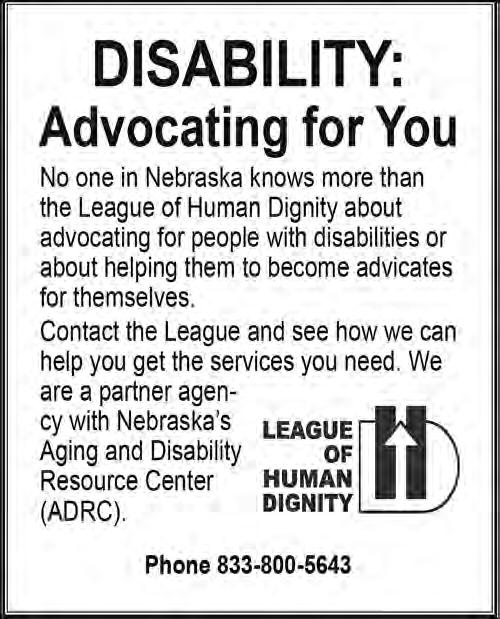
“We’re grateful to have been invited to a free concert with Hashayara. Our students love meeting people from Israel and learning more about the country and its citizens. And, of course, we always love a chance to sing and dance!” shared Beth Cohen, Head of School, Friedel Jewish Academy.
Through projects like these, the Feldman Family Foundation continues to build bridges and celebrate the enduring connection between Omaha and Israel.
If you are interested in setting up a supporting foundation or would like to learn more about other types of funds you can establish, please contact Amy Bernstein Shivvers at the Jewish Federation of Omaha Foundation at 402.334.6466 or ashiv vers@jewishomaha.org
B’NAI B’RITH BREADBREAKERS
The award-winning B’NAI B’RITH BREADBREAKERS speaker program currently meets Wednesdays via Zoom from noon to 1 p.m. Please watch our email for specific information concerning its thought-provoking, informative list of speakers. To be placed on the email list, contact Breadbreakers chair at gary.javitch@gmail.com


RABBI STEVEN ABRAHAM
Beth El Synagogue
In our daily prayers, we end with the words Shome’a Tefilah-“May God hear our prayers.” We do not demand that God answer; we ask only to be heard. To be heard by Heaven is no small thing. But sometimes, against all odds, Heaven not only hears-it answers.

This week, we are seeing that answer unfold. Hostages-sons and daughters, mothers and fathers-are being released. Their faces, once frozen in fear, now shine with light. For months, we prayed their names, marched for their freedom, and refused to stop hoping. We sowed in tears. Now, at last, we begin to reap in joy.
“When the Lord restored the captives of Zion, we were like dreamers. Our mouths were filled with laughter, our tongues with songs of joy… Those who sow in tears shall reap in joy.”
(Psalm 126)
This psalm captures that trembling instant when history bends toward mercy. It does not deny the sorrow that came before; it sanctifies it. Those who sow in tears-parents who would not stop believing, communities who would not stop praying-now taste the first sweetness of return.
We give profound thanks for the twenty living hostages who, God willing, are now being restored to the loving arms of their families. Their release is a moment of divine compassion and human courage intertwined. And we hold close the families who have received not reunion but heartbreakwhose loved ones return only in memory, or whose remains are finally being brought home. May they be comforted among the mourners of Zion and Jerusalem, and may the memory of the lost strengthen our resolve to cherish life and defend it.
We offer sincere gratitude to President Trump and to all those whose tireless efforts and resolve have helped bring this moment to pass.
Even as we celebrate this moment of redemption, we continue to hope that it may also mark a turning point for our neighbors. May the Palestinian people one day be able to choose their own destiny-to choose leadership that seeks not destruction but life, that builds a future grounded in dignity, peace, and self-determination. Perhaps one day, these two peoples can live side by side in peace-two nations devoted to the welfare of their own people and to the sanctity of life itself.
Psalm 126 ends not with triumph but with a prayer: “Restore our fortunes, O Lord, like streams in the Negev.” Even in joy, we know our work is unfinished. We continue to pray for peace in a land that has known too much sorrow. Today, we allow ourselves to exhale. We cry tears of relief; we whisper words of thanksgiving. The God who hears has, in this moment, answered. May we live up to this gift-as a people grateful for mercy, steadfast in memory, and unwavering in our hope.
Hodu l’Adonai ki tov, ki le’olam chasdo-Give thanks to the Lord, for He is good; His steadfast love endures forever.

Continued from page 1
Maxim Herkin: Abducted from the Nova music festival, Herkin, 37, had returned from visiting his native Ukraine a week before Oct. 7. He was born in the war-torn Donbas region, which is part of Ukraine but claimed by Russia, and has a daughter who lives in Russia, so Russia has advocated for his release.
Hamas released a video of Herkin in May 2025, saying he had been injured when Israeli troops bombed the tunnel where he was being held.
Eitan Horn: Horn, 38, was abducted while visiting his older brother, who was released in the first phase of the deal. Hamas released a video showing Horn pleading for an end to the war as his brother Yair was taken from him to be released in February 2025.
Segev Kalfon: Kalfon, 27, was taken hostage from the Nova music festival. A first sign of life came from released hostages in February 2025.
Bar Kupershtein: Kupershtein, 23, was abducted from the Nova music festival, where he was working. A report from a released hostage in February, followed by a hostage video published by Hamas in April, offered the first signs of life for him since Oct. 7. His father Bar, who had suffered a brain injury before Oct. 7, relearned to talk during Kupershtein’s captivity.
hostage in his own car in front of his wife and young children. He appeared alive in a video released by Hamas in April 2024, and a new sign of life was received in February 2025. Hamas then released a video of him in April 2025.
of life was received for him during the ceasefire in early 2025.
Yosef-Chaim Ohana: Taken hostage from the Nova music festival, Ohana, 24, reportedly aided festival-goers before being abducted. His family said in February 2025
where 16 others were killed. The first sign of his life came after other hostages were released in February. His mother said she had been told that he was being chained, starved and beaten in captivity.
Avinatan Or: The boyfriend of Noa Argamani, who was rescued from Hamas captivity in June 2024, Or, 32, was one of the first Israelis to be seen in footage of an abduction. A released hostage said in March 2025 that he had recently encountered Or in captivity, marking the first definitive sign of life for him.
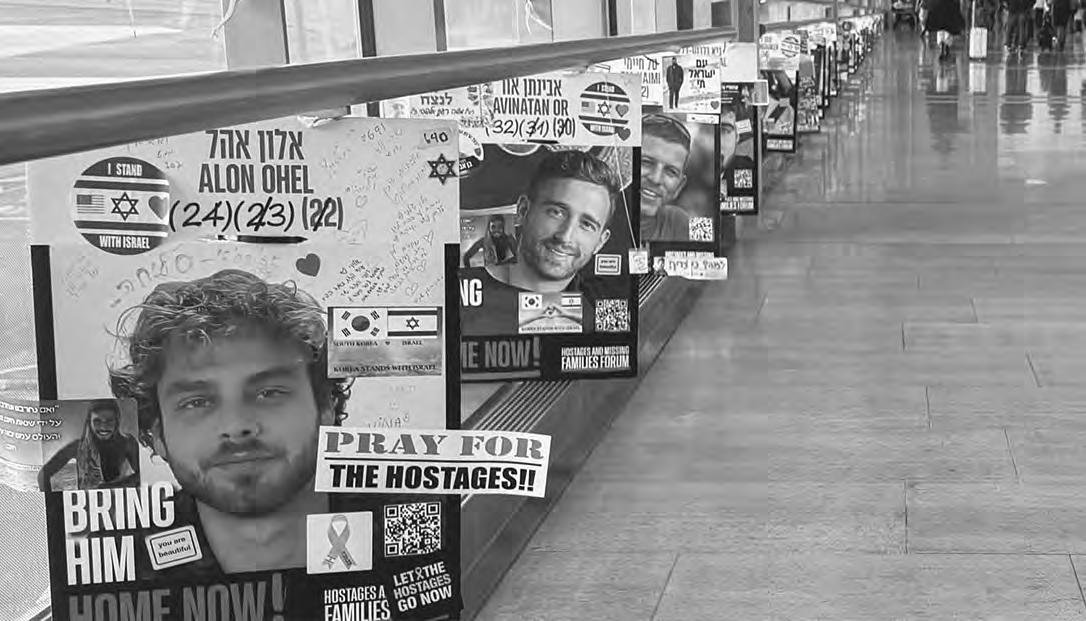
Omri Miran: Miran, 48, was taken
Eitan Mor: Taken hostage while working as a security guard at the Nova festival, Mor is 25-years-old. A friend with whom he was abducted was found dead in Gaza, but a sign
MARTY SHUKERT
On Thursday evening, Oct. 30, Beth El is proud to unveil a major new artwork “Beth El Circles of Time” by the noted artist Eliska Greenspoon of New Haven, Connecticut, and a former resident of Omaha. This event will occur in conjunction with a presentation by Yair Rosenberg, staff writer at The Atlantic sponsored by the Klutznick Custodial Fund of the Jewish Federation of Omaha and recognizing the important role of Professor Leonard Greenspoon z”l, and the late husband of the artist, for his distinguished career as holder of the Philip and Ethel Klutznick Chair in Jewish Civilization at Creighton University.
The work is a gift to the congregation in memory of Marlene W. Hechtman by her grandsons Marty, Ben, and Lev Nachman. Their mother, Beth Staenberg, was deeply involved in all aspects of the project, including developing its creative concept. She wanted the piece to express the rich and evolving history of Beth El, but in a way that was not merely a conventional timeline.
The artist described the finished work, which measures 4 feet by 12 feet when assembled, as follows:
“Circles of Time” is a textured and layered

image that reflects Beth El Synagogue’s timeline. It is comprised of 4 panels 1930-1960, 1960-1990, 1990-2010, 2010-Now. The complexity of the backgrounds and the arrangements of the textural elements suggest dense and interconnected narratives of the synagogue’s development and communal activities. The graphic circular image within a grid presents a compass-like element moving forward into the future. The four panels move from predominantly blue tones to a gradual introduction of explosive color signifying optimism. The artwork serves as a peek into the visual history of Beth El Synagogue celebrating community, faith and tradition.
This writer has had the pleasure of viewing the finished work in the artist’s studio and it is truly stunning. The entire community is invited to the unveiling with comments by Ms. Staenberg, Rabbi Steven Abraham, and Ellie Greenspoon, which will take place in Beth El’s Community Court at 6 p.m. to be followed by a reception and Mr. Roseberg’s highly anticipated presentation. It promises to be a very rewarding evening at Beth El. If you are planning to attend the art unveiling and reception, RSVP to Beth El Synagogue at smetz @beth el-omaha.org
‘Write With Us,’ our small and intimate writing workshop (no need to be nervous) continues in the Fall. Upcoming workshops are scheduled for Nov. 13 and Dec. 11 from 5-7 p.m. in the Noshery at the Staenberg Omaha JCC. Register by contacting Jessi at jtaylor@ jewishomaha. org or Annette at avandekamp@jewish omaha.org. There is no cost to attend, although donations are always welcome. If you have wanted to write your family’s story, that great American novel, or you have always wanted to try your hand at poetry, join us! Maybe you are already an accomplished writer, but you would benefit from being in a room with other writers. Perhaps you have convinced yourself you can’t write at all, but would love to try. Everyone, from absolute beginner to professional, is welcome to attend. We will provide the kosher snacks and the writing prompts.
that it had gotten a “clear indication” that Ohana was alive.
Alon Ohel: Ohel, 24, was one of four Nova festival-goers to emerge alive from a shelter
Matan Zangauker: Abducted with his partner from their Nir Oz home, Zangauker, 25, has maintained prominence because of the aggressive advocacy of his mother Einav, who was briefly banned from the Knesset because of her demonstrations. His partner was released in November 2023. When Yair Horn was released, Hamas forced him to hold an hourglass attached to a base with a picture of Zangauker and his mother, with the message, “Time is running out.” Hamas released a new picture of him in June and said he would be executed if troops tried to rescue him.
SENIOR RABBI BENJAMIN SHARFF, RABBI DEANA SUSSMAN BEREZIN AND CANTOR JOANNA ALEXANDER
“Baruch Atah Adonai, Eloheinu Melech Ha’olam, Matir Asurim.” “Blessed are You, Adonai our God, Sovereign of the Universe, who frees the captives.”
The last living hostages are home after 738 days in captivity. There is a ceasefire in place. What the future holds for the entire region is unclear. We pray for a permanent end to the violence and a solution that enables everyone to live with dignity, peacefully, under their own auspices.
On this eve of Simchat Torah, where we end the reading of Torah and begin again anew, we are grateful for the end of the war and pray for new beginnings. We continue to acknowledge the tremendous tragedies that have unfolded over the past two years, the communal and individual suffering.
Here at Temple Israel, we are also committed to continuing to do the sacred work of healing our own relationships within our sa-
cred community. As Rabbi Sharff spoke about on Friday, we have an opportunity to build and rebuild on the values of dialogue, relationship, and repair. It does not mean forgetting; rather, it means understanding that we are all hurting.
In the coming days and weeks, we will be working on creating new rituals and prayers to acknowledge what was lost as well as our collective hopes for what can come. We do know we are forever changed, and how our lives will move forward has yet to be written. But for today, we are simply grateful that the hostages are home and that there is the possibility of an end to the war.
Baruch Atah Adonai Eloheinu Melech Ha’olam, O’seh Hashalom, Blessed are You, Adonai our God, Sovereign of the Universe, who helps us to create peace.
In this season, we are commanded to live with joy and to see that joy in our lives every day.
Moadim L’Simcha.

ANDREW SILOW-CARROLL
Like most synagogues, Congregation Beth El in South Orange, New Jersey, added new rituals after the Oct. 7, 2023 attacks that killed 1,200 in Israel, saw another 251 taken hostage and launched a grinding war between Israel and Hamas.
The Conservative congregation hung a “bring them home now” sign out front on behalf of the hostages. Rabbi Jesse Olitzky added the “Acheinu” prayer for redeeming captives to the weekly Shabbat service, and each week read the biography of a hostage. As the war raged on, the congregation sang songs of peace.

There and elsewhere, congregants wore yellow hostage ribbons and pins on their lapels, and dog tags with the names of the missing. Some families lit extra candles on Shabbat. Rachel Goldberg-Polin, whose son Hersh would eventually be listed among the dead in Gaza, popularized the wearing of a piece of masking tape on which she wrote the number of days since the hostages were taken.
This week, as the last 20 living hostages were returned to Israel as part of a cease-fire deal between Israel and Hamas, many Jews are relieved to be ending these rituals — even as they question whether it is right to do so and wonder how to channel their prayers and practices toward whatever comes next. Twenty-four deceased hostages are believed to be in Gaza, and even as soldiers return home and Gazans reclaim what’s left of their former lives, an enduring peace seems far away.
At Beth El, the Acheinu and lawn sign will stay in place until the bodies are returned. In the meantime, Tuesday night’s celebration of Simchat Torah will be a chance to experience a sense of relief members haven’t felt in two years.
“Like so many, we haven’t been able as a people to move forward and get to Oct. 8 until the hostages came home,” Olitzky said Monday, hours after Hamas released the living hostages. “And now there is a sense of being able to exhale and breathe and, God willing, to move forward, to rebuild, and for all Israeli citizens and for Palestinians to have opportunities to build peace.”
A video imagining the end of the war made by Israeli pop star Yoni Bloch in January showed Israelis pulling down “Bring Them Home” posters and cutting yellow ribbons off their car doors. This week, rabbis and Jews in the pews are asking if it is time to move forward.
Rabbi Yael Ridberg, the recently retired spiritual leader of Congregation Dor Hadash in San Diego, said she would remove the ribbon and dog tag she wears when the bodies of the deceased hostages are returned.
“I look forward to tucking them away, but not disposing of them,” she wrote in response to a journalist’s query. “I will stop wearing them when all the deceased hostages are returned. These are keepsakes of a time worth remembering, as hard as it has been for the last two years.”
Ronit Wolff Hanan, the former music director at Congregation Beth Sholom in Teaneck, New Jersey, said she is not sure

what to do with the ribbon pin and dog tags she’s worn for most of the past two years. She’s torn between “this unbelievable release and relief and joy,” and sadness that there are still 24 bodies yet to be returned.
“My whole thing is, well, what do we do now?” said Wolff Hanan, a dual U.S.-Israeli citizen whose son served over 300 days in the Israeli reserves during the war. “I keep thinking about the long, difficult road all of these hostages and families have ahead of them, and it’s just unimaginable. But also I’m thinking about, when it is really over? We don’t know if this is the dawn of a new era or if we are going to go back to the same old, same old.”
Her partner, Rabbi Eli Havivi, offered his own solution to a similar dilemma: In synagogue on Monday morning, he wore his hostage dog tags, but covered with blue painter’s tape, in order to suggest that “it’s over, but it is not over.”
On a Facebook page for Jewish women, a number of members spoke of their reluctance to stop lighting extra candles. Some felt that if they did, it would break a kind of spiritual commitment, or might suggest that they’ve given up on the freed hostages who will continue to have mental and physical challenges. Some referred to a passage from Talmud (Shabbat 21b) that extends the metaphor of the Hanukkah candles to suggest that someone should always add light, not subtract.
By contrast, the comic Periel Aschenbrand wrote that she was eager to take off the button that she’d been wearing in solidarity with Omri Miran, a hostage abducted in front of his wife and two children on Oct. 7. “I can’t wait to be able to take it off tomorrow, and for Omri to be reunited with his daughters and family,” she wrote Sunday on Instagram.
Alyssa Goldwater, an Orthodox influencer, wrote that she too is “really looking forward” to taking off the yellow ribbon pin she’s worn over the past two years, but that removing doesn’t mean forgetting.
“When you remove a pin, the tiny holes never fully go away,” she wrote on Instagram. “They will remain and serve as a reminder that we will never forget what has happened to us over the last two years. We will never forget who stood by us and who stood soundly or against us. The holes will be tiny because we pray that the hostages will be able to eventually heal and live their regular lives again, where the unimaginable travesties they’ve been through won’t even be noticeable in the human eye, but the holes will remain, because this is a part of us now.”
Long before Oct. 7 led to a torrent of new practices, Jews altered their prayers and rituals in tune with current events, with some changes handed down from rabbis and others bubbling up from the “folk.”
Some changes stick — like the Av HaRachamim memorial prayer, composed in the Middle Ages for those who perished in the Crusades — and others fall away. In the 1970s and ’80s boys and girls celebrating their b’nai mitzvah “twinned” with Soviet Jews unable to emigrate. Adults wore silver bracelets with the name of these refuseniks, and put them away when
How are you, your synagogue or Jewish institution marking the release of the hostages? Drop us a line at newsdesk@jta.org.


the emigration restrictions fell.
The additions and changes that persist usually speak to other events, the way Av HaRachamim has become a weekly reminder of various Jewish tragedies. In general, however, a prayer or ritual that responds to current events “should have a theoretical timestamp for when it exits stage left, even if we cannot always know when that time will come,” Rabbi Ethan Tucker, president and rosh yeshiva of Hadar, explained in a Facebook post discussing the transition away from Oct. 7 practices. “Without that foresight and planning, the addition either straggles on, eventually becoming a kind of exhibit in the gallery of prayer, or it simply fades away when monotony and detachment have gotten the better of it.”
The Jewish calendar itself seemed to conspire in the spiritual turbulence of many Jews: The hostage release came on the eve of Israelis’ celebration of Simchat Torah — and the second anniversary, on the Hebrew calendar, of the Hamas attacks.
The holiday is meant to be a day of unbridled joy. A centerpiece of Simchat Torah is the hakafah, when congregants dance with and around the Torah scrolls.
Last year, congregations struggled with how to match the happy themes of the holiday with the one-year anniversary of the worst attack in Israel’s history. Olitzky said his congregation began last year’s Simchat Torah festivities with a “solemn” hakafah, where congregants sang Israel’s national anthem and a somber Hebrew song while standing still. Olitzky said he took solace at the time in the words of Goldberg-Polin, who said, “‘There is a time to sob and a time to dance’ and we have to do both right now.”
And while the release of the hostages is also tinged with sadness — for the lost years, the captives who didn’t make it, the suffering still to come — many will use the holiday as a celebration of deliverance and gratitude.
The release of the hostages, Olitzky said, will “allow Simchat Torah to be that — the holiday when we are supposed to have so much joy. Last year it was difficult to find that joy on Simchat Torah. I truly believe that we will have a greater opportunity in the days ahead to sing and dance.”
Adat Shalom, a Reconstructionist synagogue in Bethesda, Maryland, will use Simchat Torah to celebrate the hostages’ return by ending another common practice since Oct. 7: a chair left empty on the synagogue’s bima, featuring the image of a missing hostage.
During the dancing on Simchat Torah, marked on Tuesday night outside of Israel, the congregation will bring the chair and use it to lift up members wedding-style. “We have a lot of people in the community who are really close with the Hostages and Missing Families Forum in Washington,” said Rabbi Scott Perlo. “We’re going to take that very chair, and take it from its depths and lift it up, and make it the centerpiece of our joy.”
Adat Shalom rotated in a number of special prayers and readings over the past two years, acknowledging, Perlo said ruefully, that “there’s so much to pray for,” including “the hostages, the safety of our family in Israel, the safety of people in Gaza,” and the state of American democracy.
He understands that some congregants may be wary of letting go of the new rites and prayers — perhaps afraid that if they don’t keep up the tradition, the horrors that prompted their prayers will only return.
“So what I would say to them is some version of, ‘Yes, don’t let it go completely, but let it transform into something new,’”
See Letting Go page 5

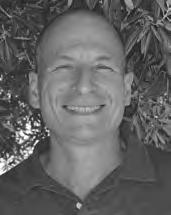
TEDDY WEINBERGER
Master Sgt. (Res.) Shmuel Rahamim (31) was mortally wounded in Gaza on Tuesday Oct. 7 of this year, the first day of Succot. Shmuel was a classmate of my son Elie, and for the last two-and-ahalf years of our time in Givat Ze’ev, Shmuel ate every Shabbat lunch with us (and on those occasions when we were invited out to eat with friends, we would bring Shmuel along). In the two years of this war, over 900 soldiers were killed. I felt sad when I read about their deaths, but to get the news about someone you know, someone you love? Utterly devastating.
We got the first report about Shmuel on Tuesday night Oct. 7. Shmuel had been critically wounded in “an accidental grenade blast.” He was evacuated from Gaza to Soroka hospital in Be’er Sheva. On Wednesday, amidst the terrible news about Shmuel during Judaism’s happiest holiday, came another surreal element: a report that Israel and Hamas had reached an agreement to release hostages and prisoners. So as my family is praying for a “refu’ah shlaymah” (complete recovery) for Shmuel Gad ben Anat, the plaza in front of the Tel Aviv Museum of Art (aka “Hostages Square”) is overflowing with people celebrating the end of the war and the return of the hostages.
Early on the morning of the fourth day of Succot, Friday Oct. 10, our son Elie went to Soroka. At the same time, Sarah attended a huge prayer service at Hostages Square. Though she would still have had a relatively long drive to Soroka from the Square, Sarah had thought to join Elie, but an update from him stopped her. Elie said that Shmuel’s two brothers and sis-
ter had been told to come to the hospital to say goodbye to him. Elie told of a very difficult experience at the hospital, with Shmuel’s mother screaming: “Shmuel wake up, Shmuel wake up.”
On Saturday night Oct. 11, as we’re watching special envoy to the Middle East Steve Witkoff address an ecstatic crowd of 400,000 at Hostages Square, we get the phone call from Elie: Shmuel had died over the course of Shabbat. Though we knew to expect the worst, we all had been praying for a miracle, but it did not come. The next day, the 6th day of Succot, Shmuel was buried at Mt. Herzl, Israel’s main military cemetery. While Jewish law does not permit eulogies at funerals held during the intermediate days of Succot (the family will only start sitting shiva on Tuesday night Oct. 15, at the conclusion of Simchat Torah), the short speeches were introduced as “parting words.” We learned of Shmuel’s absolute commitment to the release of the hostages, a commitment that led him to ask to be assigned to a new Reserve Company after his own was discharged (Shmuel served about 400 days over these two years). Shmuel’s family spoke of how happy he would have been to learn of the hostages’ impending release.
Who was Shmuel for our family? He was a relatively quiet, sensitive young man who accorded himself well no matter whom he found at our Shabbat table. Whether all of our children were present, or just some of them, whether we had guests, or whether it was just Sarah and me, Shmuel was a wonderful, thoughtful presence at our table. My oldest child, Nathan (37), had this to say about Shmuel on our extendedfamily chat: “I remember him as a sweet, respectful kid who seemed to be able to always read the room and adapt himself to engage anyone in conversation.”
Dear Reader, you might be wondering: How did it come
about that Sarah and I found ourselves hosting a young man, week after week, who had never been one of our son’s closest friends? The answer: Shmuel came from a family that had a traditional Friday night meal but that did not have a Shabbat lunch. After Elie brought Shmuel home by chance that first time, on a Saturday after morning services around the beginning of 2017, we realized that if Shmuel was to have a Shabbat lunch, it would have to be at our home. Sarah and I could have chosen not to involve ourselves with Shmuel’s life, but we did. In honor of Shmuel, Dear Reader, I would like to encourage you to consider a crazy “act of lovingkindness.” Not a “one off” act, but a continued and persistent act of kindness. You have an elderly neighbor? Every time you bake something, share some of it with her. That harried, single mother across the street with three small children? Every time you mow your own lawn, mow hers as well. The possibilities are endless. Why should you put yourself out for people who are basically “strangers?” Because you should.

Rest in peace, my sweet Shmuel, rest in peace. Teddy Weinberger, Ph.D., made aliyah with his wife, former Omahan Sarah Jane Ross, and their five children, Nathan, Rebecca, Ruthie, Ezra, and Elie, all of whom are veterans of the Israeli Defense Forces; Weinberger can be reached at weinross@gmail.com.
SAMUEL RAVITZ (1905–1915)
Each time I pass the wall of past presidents at the Jewish Federation of Omaha, I’m reminded that every portrait holds a story. The very first belongs to Samuel Ravitz, elected in 1905, who helped bring order and unity to a community that was still young and finding its way. His picture may hang quietly on the wall, but his presence is woven into the life of Jewish Omaha.

Samuel was born in 1869 and came to Omaha as a young man of about twenty. We do not know where he was born or what drew him west, but once here he quickly became part of the fabric of the community. He worked as a junk dealer, and a story in the Omaha World-Herald once described him being attacked by a neighbor’s dog that bit him and ran off with his pocketbook containing eighteen dollars. It is a small story, but one that hints at the grit and determination required of immigrants making their way in a new city.
Continued from page 4 said Perlo.
Rabbi Felipe Goodman of Temple Beth Sholom in Las Vegas, Nevada, also plans to incorporate a ritual of release and transformation during Simchat Torah celebrations on Tuesday night. He’s asking congregants to bring their yellow pins and dog tags and place them on an heirloom Torah cover. “This cover will be dedicated as a memorial and displayed at the entrance of our Temple, so that every time we walk through through Our Temple’s doors, we will remember what happened on Oct. 7, 2023,” he wrote in a message to members.
On Sunday, Hanna Yerushalmi, a rabbi based in Annapolis, Maryland, shared a poem on Instagram, called “Yellow Chairs” that imagined a near future in which hope will transform the fraught symbols of Oct. 7 grief and remembrance. It reads in part:
Empty chairs will be saved for friends arriving late, and tape will be tape again, and hostage necklaces will be put away, forgotten in drawers. and Saturday night will be date night once again.
In 1893, Samuel married Anne Silberman, and together they raised five children: Sol, Millie, twins Dave and Harry, and Ben. Family was his anchor, even as his commitment to the Jewish community grew. Anne passed away in 1931, and Samuel died suddenly in 1944 at his home on South 42nd Street. Both are buried at Golden Hill Cemetery, Beth Israel’s first cemetery, where so many of our community’s early stories rest.
By the time Ravitz became president, Omaha’s Jewish life was active but scattered. Relief work was handled by multiple groups, most prominently the Jewish Ladies Relief Society and the Associated Jewish Charities. Historian Carol Gendler notes that the AJC was formally established in 1907, which means that in his early years as president, Ravitz presided over a loose coalition of organizations. In 1914, the Omaha Daily Bee reported that leaders had concluded it was time to consolidate. Under Ravitz’s guidance, more than twenty organizations, including synagogues, the Free Loan Society, Wise Memorial Hospital, and the Omaha Lodge of B’nai B’rith, joined together with the AJC and the Ladies Relief Society.
From that decision, the Jewish Federation of Omaha began to take shape.
Service became the rhythm of his life. Ravitz led Talmud Torah for fifteen years and was later honored as its lifetime vice president. He guided B’nai Israel Synagogue, including during its 1920 mortgage-burning celebration. From 1929 until his death, he served as president of the Mizrachi Zionist Organization, and he also lent his energy to the Jewish Community Center, the Welfare Federation, the Omaha Hebrew Club, and the Free Loan Society. His name appears again and again in the record of early Jewish Omaha, always attached to the institutions that gave the community strength and continuity.
So when you next pass that wall, pause for a moment. Think of Samuel Ravitz — the young immigrant who arrived with determination, the leader who believed in unity, and the man who set in motion more than one hundred twenty years of Jewish life in Omaha. His story is not the whole history of the Federation, but it is where that history begins.

At CareMATRIX, we simplify the search for senior living with our FREE, personalized service. Our expert advisors help families navigate the options, whether it’s independent, assisted, or memory care. We offer tailored recommendations from our extensive network and accompany you on in-person tours to ensure you make an informed choice. Let us guide you through this important decision. For more information, please visit our website at www.CareMatrix.net or reach out directly.

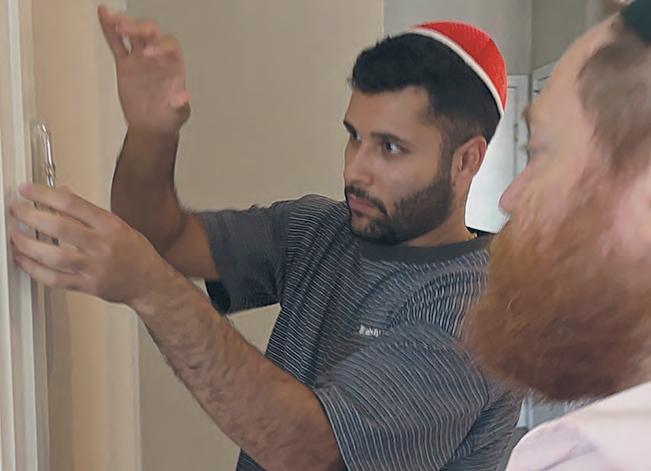


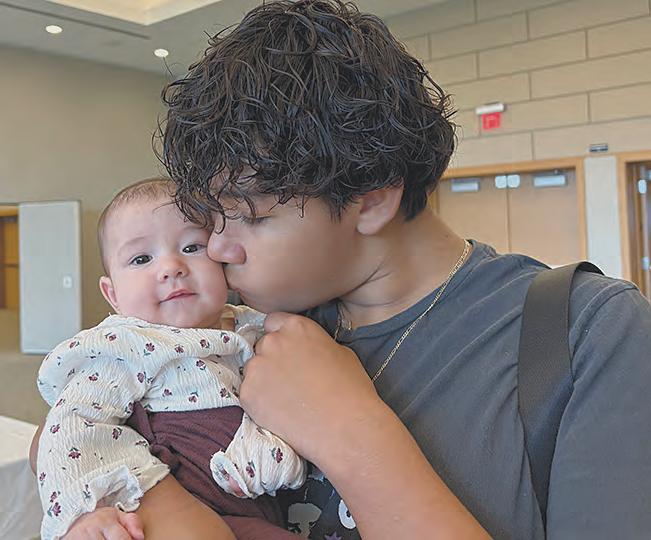
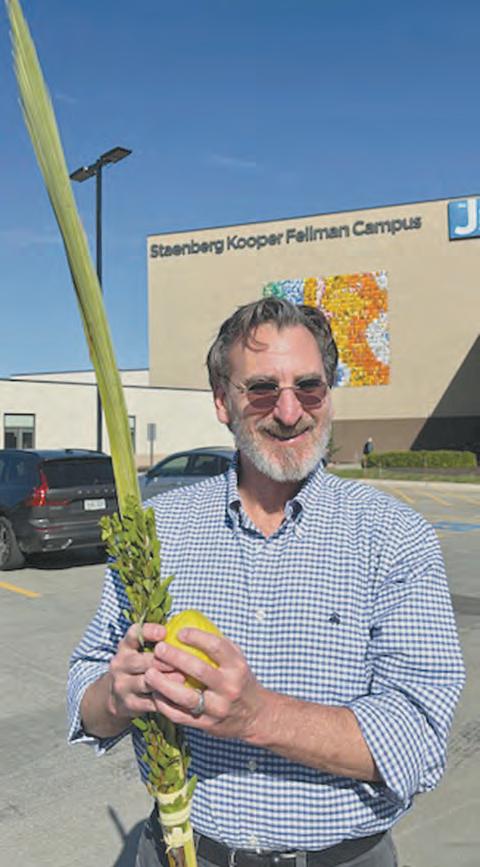

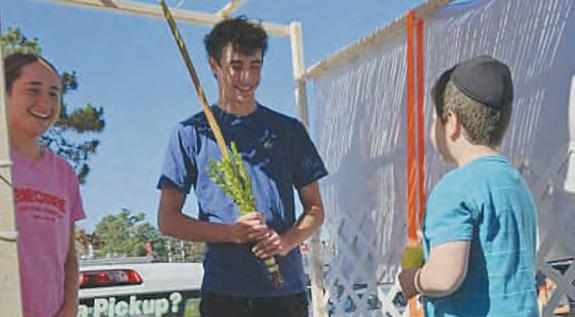
PHOTOS FROM RECENT JEWISH COMMUNITY EVENTS
SUBMIT A PHOTO: Have a photo of a recent Jewish Community event you would like to submit? Email the image and a suggested caption to: avandekamp@jewishomaha.org

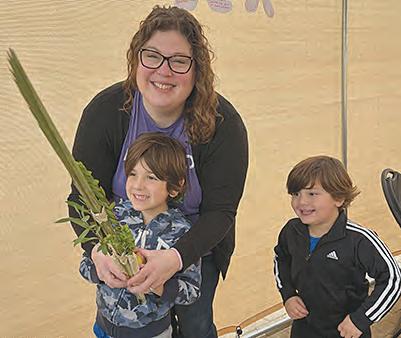



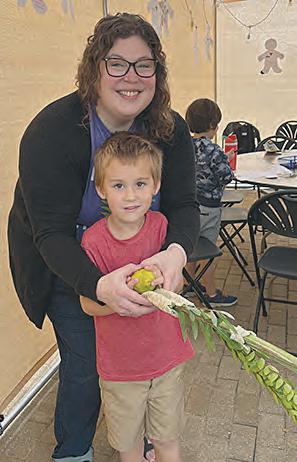
Sunday October 12, Shaliach Itay made a presentation about his experiences from the war to BBYO teens and other community members


This Mezuzah case belongs to Randi Jablin.
“Several months ago,” she said, “I was looking through my father’s (Leonard L Friedel, OBM) old jewelry box and came across this mezuzah. With his passing in 2002, of course I was

unable to ask him about its origin.
“Questions flooded my mind: Did his mother or father bring it from the Old Country (Poland and/or Russia) in the early 1900s? How old is it?
“Was it on the doorpost of his childhood home at 4919 California Street?
“I decided then and there that it needed to come out of the jewelry box in my office closet and be placed on the doorpost of my office! I did not have it inspected, but at least I see it every day and am connected to my father and paternal grandparents (whom I never knew) every time I walk through that door!”
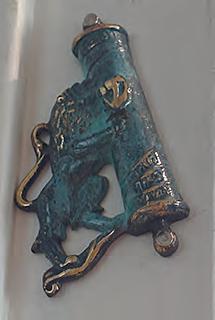
Are you thinking about your own case? We would love to hear from you, and see what is divinely protecting your scroll and your home. We hope you will feel inspired, and are ready to share your story with us.
For additional questions, please email Naomi Fox at nfox@jewishomaha.org, Pam Monsky at pmonsky@jew ishomaha.org, Jane Nesbit at jnesbit@ihene.org or Annette van de Kamp-Wright at avandekamp@jewishom aha.org
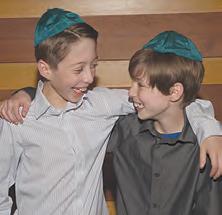

for a free book. We will happily share! Plus, some of the children’s books especially make for great presents.
Our Creative Director has generously offered his time and will be reviewing the books. This week, he read Ruby Finkelman finds the Real Magic, written by Mike King with illustrations by Shahar Kober.
When Ruby Finkelman stops brushing her teeth, her small act quickly spirals out of control. Soon, her beautiful village turns into a place no one wants to live in, or even visit.
Q: Did you learn any new Jewish jargon?
A: Zayde, kvelling, and schmutz mouth. I never did learn what that first one meant, but I figured out the other two before reaching the glossary in the back.
Q: Who is this book for?
A: Kids, clearly. But it’s got a big draw for dentists and rabbis too.
Q: What is the main message?
A: To take care of yourself and others, starting with the little things, because those can grow and grow. The little thing here happens to be brushing your teeth, which did rather give away the day job of the author.
Q: Did you like it?
A: It was cute! The illustrations have a nice warmth to them and the text had a good rhythm to it for a children’s book.




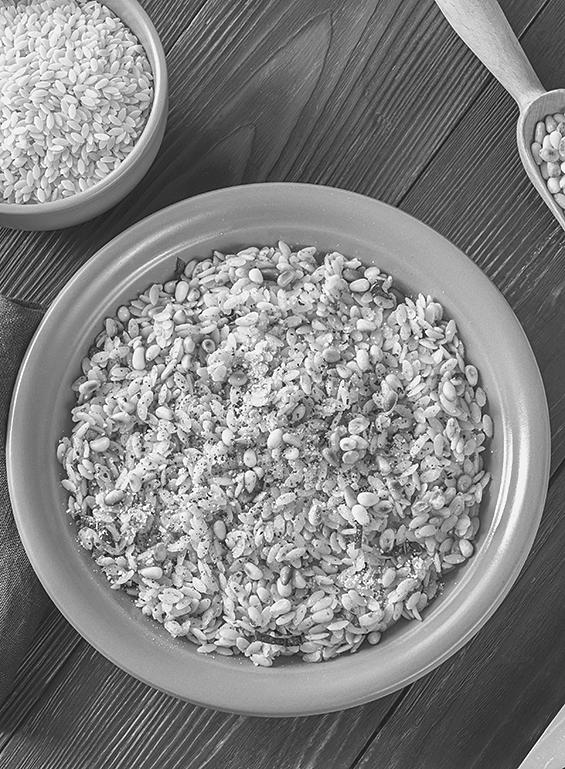
Ingredients:
1 1/2 cup orzo
1 bunch broccoli florets (about 1 lb.)
1/4 cup olive oil
3 tbsp. pine nuts
1/2 tsp. dried crushed red pepper flakes
1/2 cup freshly grated parmesan cheese (1 1/2 oz.)
1/4 cup chopped fresh basil
3/4 cup black brine-cured (Kalamata) olives, pitted and halved
3/4 cup crumbled feta cheese (about 3 1/2 oz.)
Directions:
Cook orzo for about 8 minutes. Add broccoli and cook until crisp-tender, about 2 minutes. Meanwhile, heat oil in a heavy small skillet over medium heat. Add pine nuts and stir until golden brown for about 3 minutes. Add crushed red pepper and stir until aromatic for about 30 seconds. Remove mixture from heat. Drain orzo and broccoli. Transfer to a large bowl. Pour oil mixture over. Add feta, olives, parmesan cheese, and basil. Toss to coat. Season with salt and pepper.
Jewish foods survive only in the tired humor of tired comedians; American Jews are more familiar with sushi than gefilte fish.
JOSHUA HALBERSTAM Philosopher and author Schmoozing: The Private Conversations of American Jews 1997

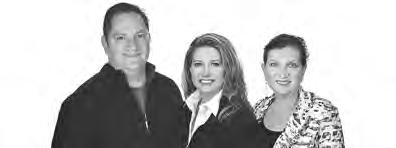

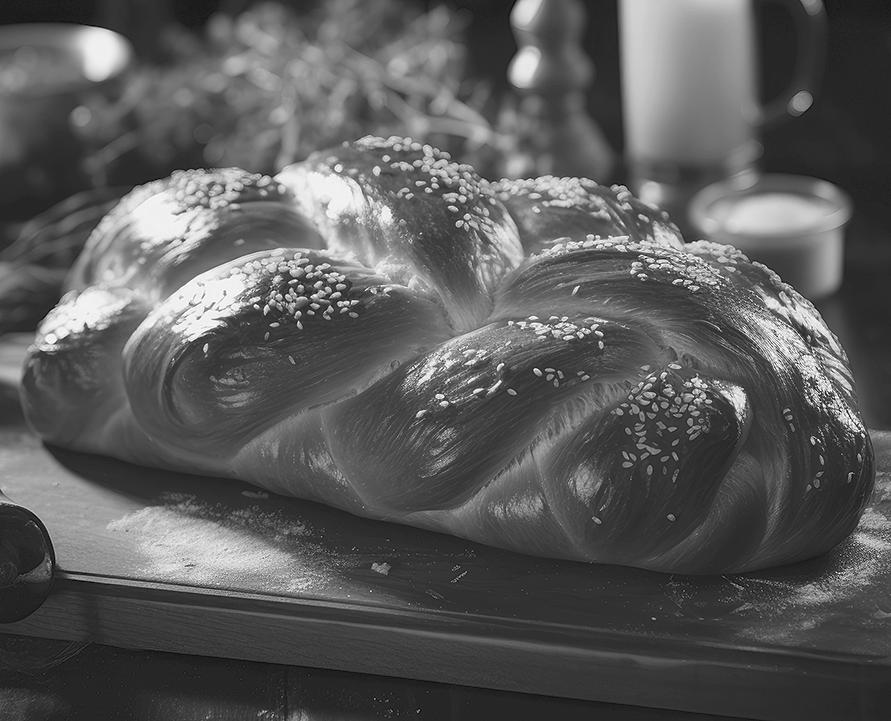
Ingredients:
1/2 cup and 2 tbsp. sugar, divided 3 pkgs. yeast, divided 1 cup warm water, divided
6 cups flour
5 eggs
½ cup oil
1 tbsp. salt
1 egg yolk
Directions:
Preheat the oven to 350 degrees. Mix 1 tbsp. sugar, 1 1/2 pkg. yeast, and 1/2 cup water. Set aside to rise. Put 6 cups flour in a bowl. Make a well in the center. Pour yeast mixture in well, then add 5 eggs. Mix 1/2 cup sugar, 1/2 cup warm water, and 1 1/2 pkgs. yeast. Set aside to rise. Put 1/2 cup oil, salt and 2nd yeast mixture in the well. Stir and knead dough. Add more flour until the dough is no longer sticky. Clean and oil bowl. Put dough in a bowl to rise. Cover with a paper towel. Let rise in a warm place for 1 hour. Punch down and braid dough on floured surface. Place on a greased cookie sheet and let rise for 45 min. Combine egg yolk with 1 tbsp. sugar and brush on top of dough. Sprinkle with sesame or poppy seeds. Bake for about 15-20 min. Do not over bake. Makes 3 loaves.
Ingredients:
Cake:
1 box yellow cake mix
3 oz. pkg. vanilla instant pudding
4 eggs
1 cup sour cream
1/2 cup oil
1 tsp. vanilla
Topping: 1/4 cup sugar
1/3 cup brown sugar
1 cup chopped pecans
1 tsp. cinnamon
Glaze:
1 cup powdered sugar
1/4 tsp. instant coffee
1 tbsp. hot water
1 tsp. cinnamon
1 tsp. almond extract
1 tsp. hot water
Directions:

Preheat the oven 350 degrees. Grease Bundt pan. Mix cake ingredients. In a separate bowl, mix the topping ingredients. Alternate putting ¼ topping in the pan then ¼ cake batter, etc. Bake for 1 hour. Cool and glaze.3 loaves.
BECKY KAHN
Being Jewish has always defined who I am.
It’s a pride rooted in family, in deep friendships and shared experiences. Even growing up in the Midwest, Israel was always close to heart. With subtle daily reminders. The mezuzahs, the cheesy Judaica my grandmother collected that no one can get rid of and my favorite framed selfie of course snapped in Jerusalem.
I find immense fulfillment teaching Hebrew school. I’m proud to have former students who now serve in the IDF.
But, I carry a wound that continues to fester.
Oct. 7, 2023, marks the horrific massacre in Israel. More than 1,200 men, women, and children were brutally murdered. Gone but not forgotten.
As an adult, I’m fiercely independent, authentically me and pretty unapologetic about it.
But inside, that day pulled me back to childhood. A familiar fear of insecurity, the ache of not belonging, to moments of being made to feel less than simply for being Jewish.
As the granddaughter from a family of Holocaust survivors, I hear their stories echo more loudly now. I think of my Grandma Lou, who selflessly converted to Judaism in a time when doing so wasn’t easily accepted. Their voices remind me that antisemitism has never disappeared and in many ways feels even scarier today.
I see it driving down Dodge Street.
I hear it in comments said to me in public spaces. I feel it in the way I subconsciously scan my surroundings. It’s a tension I carry quietly, every day.
I’m not asking anyone to take sides.
I’m asking you to learn more.
To challenge assumptions.
To lead with kindness.
To recognize that words don’t imply action.
To invest love in your community.
Be the spark that ignites a more compassionate tomorrow.
WE can only repair the world together.
(Founded in 1920)
David Finkelstein
President
Annette van de Kamp-Wright
Editor
Will Fischer
Creative Director
Claire Endelman
Sales Director
Lori Kooper-Schwarz
Assistant Editor
Sam Kricsfeld
Digital support
Mary Bachteler
Accounting
Jewish Press Advisory Board
David Finkelstein, President; Margie Gutnik, Ex-Officio; Joseph Abrahams, Helen Epstein, Andrea Erlich, Ally Freeman, Dana Gonzales, Mary Sue Grossman, Hailey Krueger, Chuck Lucoff, Sara Rips, Melissa Shrago, Stewart Winograd and Bob Yaffe.
The mission of the Jewish Federation of Omaha is to build and sustain a strong and vibrant Omaha Jewish Community and to support Jews in Israel and around the world. Agencies of the JFO are: Institute for Holocaust Education, Jewish Community Relations Council, Jewish Community Center, Jewish Social Services, Nebraska Jewish Historical Society and the Jewish Press Guidelines and highlights of the Jewish Press, including front page stories and announcements, can be found online at: www.jewishomaha.org; click on ‘Jewish Press.’ Editorials express the view of the writer and are not necessarily representative of the views of the Jewish Press Board of Directors, the Jewish Federation of Omaha Board of Directors, or the Omaha Jewish community as a whole. The Jewish Press reserves the right to edit signed letters and articles for space and content. The Jewish Press is not responsible for the Kashrut of any product or establishment.
Editorial
The Jewish Press is an agency of the Jewish Federation of Omaha. Deadline for copy, ads and photos is: Thursday, 9 a.m., eight days prior to publication. E-mail editorial material and photos to: avandekamp@jewishomaha.org ; send ads (in TIF or PDF format) to: rbusse@jewishomaha.org
Letters to the Editor Guidelines
The Jewish Press welcomes Letters to the Editor. They may be sent via regular mail to: The Jewish Press, 333 So. 132 St., Omaha, NE 68154; via fax: 1.402.334.5422 or via e-mail to the Editor at: avandekamp@jewishomaha.org.
Letters should be no longer than 250 words and must be single-spaced typed, not hand-written. Published letters should be confined to opinions and comments on articles or events. News items should not be submitted and printed as a “Letter to the Editor.”
The Editor may edit letters for content and space restrictions. Letters may be published without giving an opposing view. Information shall be verified before printing. All letters must be signed by the writer. The Jewish Press will not publish letters that appear to be part of an organized campaign, nor letters copied from the Internet. No letters should be published from candidates running for office, but others may write on their behalf.
Letters of thanks should be confined to commending an institution for a program, project or event, rather than personally thanking paid staff, unless the writer chooses to turn the “Letter to the Editor” into a paid personal ad or a news article about the event, project or program which the professional staff supervised. For information, contact Annette van de Kamp-Wright, Jewish Press Editor, 402.334.6450.
Postal
The Jewish Press (USPS 275620) is published weekly (except for the first week of January and July) on Friday for $40 per calendar year U.S.; $80 foreign, by the Jewish Federation of Omaha. Phone: 402.334.6448; FAX: 402.334.5422.
Periodical postage paid at Omaha, NE. POSTMASTER: Send address changes to: The Jewish Press, 333 So. 132 St., Omaha, NE 68154-2198 or email to: jpress@jewishomaha.org
Editorials express the view of the writer and are not necessarily representative of the views of the Jewish Press Board of Directors, the Jewish Federation of Omaha Board of Directors, or the Omaha Jewish community as a whole.
ANNETTE VAN DE KAMP-WRIGHT Jewish Press Editor
It may be a slightly optimistic headline I put on here; I have no idea what comes next. None of us do, really. What I do know is, my usual optimism is currently out of reach.
On Monday, Oct. 13, I chose one day of happiness (perhaps I was too tired for anything else; like many Jews I stayed awake for the hostage release) because 20 hostages were returned. That’s 20 lives; 20 families who can begin the long road of healing, even if those 737 days of captivity did irreparable harm. The rest of us can pick up some of the other pieces: how do we feel about the prisoner exchange, how do we celebrate and mourn simultaneously, when can we expect the remaining hostage bodies to be returned, will the high holidays ever feel “normal?”
There is one memory that is on continuous replay in my head: it’s a story I did after speaking with an Israeli visitor who had volunteered for the Chevra Kadisha in Southern Israel post-October 7. I can’t remember when the story ran, and there was maybe 5% of the interview that could be printed, but the memory of the interview itself is as sharp as ever.
He spoke about putting the pieces of the bodies back together, and showed me pictures of what Hamas had done. Graphic, the kind of photos we could never print in the paper-not only because our readers shouldn’t see them, but because the people in those photos deserve respect. And yet, I could not look away-because if the man in front of me had to do the work, the least I could do was bear witness, and listen to his words. It made me realize: bearing witness is hard.
I’m finding many news outlets are treating the current situation as a turning point, and maybe it ismaybe I am wrong to be so pessimistic. But I think, even if we see a real and lasting peace, so much has happened-it’s similar to seeing images of people celebrating in the streets after the end of WW II. The postwar trauma is only just beginning. We have no way of knowing how much therapy, how many sleepless nights, how much grieving is still coming.
What comes next? We have to take care of each other, and ourselves. We have to do the work of being Jews. Perhaps that means we have to continue life as if it is normal, when we all know perfectly well it isn’t.
Philosopher, author and holocaust survivor Viktor Frankl once wrote:
"There is nothing in the world that would effectively help one to survive the worst conditions as the knowledge that there is meaning in one's life."
The other day, I took a random video of a friend’s three-year-old jumping on one of those inflatable things.
The sheer joy in that video serves as a reminder that we still have a future ahead of us. You, too , probably have videos and photos on your phone of your children, your grandchildren, moments of Joy. Look at them, often.

I don’t know if Frankl is correct, but it is, at least, a place to start. That “meaning in one’s life” will be different for all of us. Maybe it is lighting candles, doing mitzvot. Perhaps it is studying harder, trying to argue less with one’s spouse. Cleaning the house before Shabbat, showing up for your children, counting our blessings.
Maybe it just means taking it one day at a time, and not expecting too much.
Personally, I haven’t made up my mind yet-I just keep putting one foot in front of the other and try to be gentle with myself. Better days will come, and so what if they are tinged with grief. We’ve been here before, haven’t we? Life goes on. It always finds a way.
And: we have community, we have love. We have random strangers who are no longer strangers, who feel just as we do. We have each other. And that is what will ultimately heal all of us.
And yes, there will be scars-how could there not be? But we will come through this, out of this, stronger than ever-we have to believe that.
What comes next? We don’t stop, that’s what. We continue living, working, praying, loving and celebrating. And we do so together, as a worldwide community, one day at a time.
And someday soon, we will dance again.
‘Dialogue’ isn’t enough to fix what ails campuses.
The past two years have been particularly challenging for Jewish college students. Our campuses, which should be places of curiosity and critical exchange, have too often become arenas of polarization. As upperclassmen, Ari at Harvard and Maya at McGill, we have watched peers feel trapped between two extremes: to take a strident side on nuanced conflicts, or to stay silent and withdraw from the conversation all together. Charlie Kirk’s recent assassination has further intensified the polarizing atmosphere. Frighteningly, some have seen his death as proof that civil discourse and free speech are impossible to achieve.
For students like us who care deeply about pluralism, this climate has felt especially isolating.
Even before Kirk’s assassination a number of university administrators were calling for pluralism and increasing investments in dialogue training. In fact, Barnard College President Laura Ann Rosenbury recently wrote an op-ed in the New York Times describing her college’s efforts to offer “courses and programs on civil discourse and dialogue.” While we’re heartened by this trend, we also recognize this isn’t the norm across universities and we’ve also come to see its limits. A mandatory workshop on “how to speak to one another” may help students avoid pitfalls but skills alone are not enough to solve the problem of polarization.
What’s missing on campuses across the country are sustained spaces where students learn to hold disagreement within a community. Over the past year, both of us have found great comfort in Jewish learning, through which we are reminded that intellectual and communal life can be most rich and vibrant when practicing the ethic of pluralism.
Jewish life has always included debate, diversity, and dialogue. The Talmud preserves arguments not for their resolution, but because the disagreements themselves are valuable. As our sages put it, a dispute for the sake of heaven is one that sustains community even when consensus is impossible. Disagreement can be a bond, not a rupture.
What Jewish wisdom has helped us recognize is that the key to pluralism is prioritizing relationships over the need to be right. We find ourselves concerned that this message is getting lost in the
rhetoric on campus and in Jewish spaces when, all too often, the response to disagreement is to throw more “facts” at the other side, to win the debate.
Last school year, we each attempted the Sisyphean task of getting those who disagree on campus into one room to no avail. It was exhausting. No matter how close we got to encouraging open conversations, at the last moment, a social media post, national or international news event or protest would dissuade participants that such a conversation was desirable or even worthwhile. The trauma and upheaval of the Israel-Hamas war further enhanced a sense of fear, grief, alienation and anger among and between our Jewish peers.
a Friday-morning bagels-and-texts group on Jewish ethics. The series opened with thorny but relatable topics — how to hold close friends accountable without becoming responsible for them — and, after a few months of steady meetings and goodwill, turned to the morality of the Israel-Hamas war. This format worked and was rooted in two practices
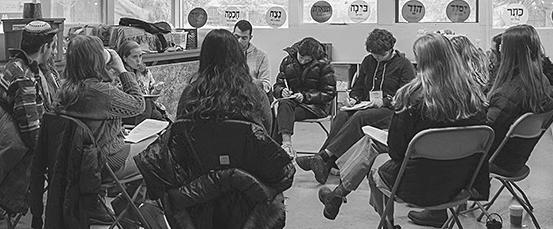
What renewed our spirits and resolve was jointly participating in a program created for Jewish college students called Campus Commons. The experience of being in a mixed group of Jewish students from across North America — politically and religiously — was inspiring and enlivening, creating a trusting community with peers who, back on our college campuses, circulate in different spheres from ours. It meant that when tensions naturally surfaced – not through force or as an illustrative exercise — they were met with care rather than defensiveness.
Being in a pluralistic Jewish community and studying Jewish texts together gave us the courage and self-awareness to examine our own personal barriers in conversation. For the first time in a long time, we felt able to express pain without being dismissed or misunderstood.
College campuses have the potential to, once again, become spaces where students can cultivate meaningful relationships before diving into debate. This is especially true of Jewish spaces on campus which are in desperate need of a relationship reset. More resources should be given to trusted campus professionals and peer leaders who can serve as relationship-builders on campus and are best positioned to foster pluralism in these environments. This includes Jewish professionals and Jewish student leaders, who are uniquely situated to cultivate pluralistic environments and initiatives, both within the Jewish community and beyond it.
At Harvard Hillel, Ari started the Oy-ntology Club,
gleaned from the Campus Commons experience: 1) chevruta, or paired Jewish study, lets students meet through a shared text, giving a common entry point and slowing reactive takes; 2) beginning on common ground and, as trust builds, easing into harder questions. Regardless of the format, technology-free and off-the-record spaces do make a difference. When students can try on views without fearing they’ll be broadcast online, diversity in perspective and the potential to become friends is much easier to come by.
We hope university administrators and community leaders will go beyond “dialogue skills,” giving students opportunities to deepen relationships and build community. Our participation in a Jewish program that prioritizes pluralism and exposed us to Jewish learning related to the values of pluralism, restored our hope that things can be different; we can act together without needing to think alike.
Ari Kohn is a student at Harvard University, where she helped start a program called Intellectual Vitality. She is an alum of Bronfman's Campus Commons, Cohort 1.
Maya Zimmerman is a student at McGill University, where she served as the Hillel president. She is an alum of Bronfman's Campus Commons, Cohort 1.
The views and opinions expressed in this article are those of the author and do not necessarily reflect the views of JTA or its parent company, 70 Faces Media.
B’NAI ISRAEL SYNAGOGUE
618 Mynster Street Council Bluffs, IA 51503-0766
712.322.4705 www.cblhs.org
BETH EL SYNAGOGUE
Member of United Synagogues of Conservative Judaism 14506 California Street Omaha, NE 68154-1980
402.492.8550 bethel-omaha.org
BETH ISRAEL
SYNAGOGUE
Member of Union of Orthodox Jewish Congregations of America 12604 Pacific Street Omaha, NE. 68154
402.556.6288 BethIsrael@OrthodoxOmaha.org
CHABAD HOUSE
An Affiliate of Chabad-Lubavitch 1866 South 120 Street Omaha, NE 68144-1646
402.330.1800 OChabad.com email: chabad@aol.com
LINCOLN JEWISH COMMUNITY:
B’NAI JESHURUN
South Street Temple
Union for Reform Judaism
2061 South 20th Street Lincoln, NE 68502-2797
402.435.8004 www.southstreettemple.org
OFFUTT AIR
FORCE BASE
Capehart Chapel 2500 Capehart Road Offutt AFB, NE 68123
402.294.6244 email: oafbjsll@icloud.com
TEMPLE ISRAEL
Union for Reform Judaism (URJ) 13111 Sterling Ridge Drive Omaha, NE 68144-1206
402.556.6536 templeisraelomaha.com
LINCOLN JEWISH COMMUNITY:
TIFERETH ISRAEL
Member of United Synagogue of Conservative Judaism 3219 Sheridan Boulevard Lincoln, NE 68502-5236 402.423.8569 tiferethisraellincoln.org
Monthly Speaker Series Service, Friday, Nov. 14, 7:30 p.m. with guest speaker Beth Dotan. Our service leader is Larry Blass. Everyone is always welcome at B’nai Israel!
For information about our historic synagogue, please visit our website at www.cblhs.org or contact any of our other board members: David Alloy, Renee Corcoran, Rick Katelman, Gail Kenkel, Janie Kulakofsky, Howard Kutler, Ann Moshman, Mary-Beth Muskin, Debbie Salomon and Sissy Silber. Handicap Accessible.
Services conducted by Rabbi Steven Abraham and Hazzan Michael Krausman.
IN-PERSON AND ZOOM MINYAN SCHEDULE:
Mornings on Sundays, 9:30 a.m.; Mondays and Thursdays, 7 a.m.; Evenings on Sunday-Thursday, 5:30 p.m.
FRIDAY: Nebraska AIDS Project Lunch, 11:30 a.m.; Kabbalat Shabbat 6 p.m. at Beth El & Live Stream.
SATURDAY: Bat Mitzvah of Talia Kohen, 10 a.m. at Beth El and Live Stream; Jr. Congregation (Grades K12), 10 a.m.; Havdalah, 7:05 p.m. Zoom Only.
SUNDAY: BESTT (Grades K-7), 9:30 a.m.; Adult
B’nai Mitzvah, 9:30 a.m. with Hazzan Krausman; Torah Tots, 10:30 a.m.; USY Goes to Vala’s, 4 p.m.
MONDAY: Baking Day, 10 a.m.
TUESDAY: Mishneh Deot & Sefer HaMiddot, 10:30 a.m. with Rabbi Abraham; Gesher Lounge Night (Grades 6-8) 6 p.m.
WEDNESDAY: BESTT (Grades 3-7), 4 p.m.; Hebrew High (Grades 8-12), 6 p.m.
THURSDAY: Tai Chi, 1:30 p.m. with Beth Staenberg; “Circles of Time” Artwork Installation by Ellie Greenspoon 6 p.m.; Yair Rosenberg 7 p.m.
FRIDAY-Oct. 31: Kabbalat Shabbat 6 p.m. at Beth El & Live Stream.
SATURDAY-Nov. 1: Shabbat Morning Services 10 a.m. at Beth El and Live Stream; Jr. Congregation (Grades K-12), 10 a.m.; Havdalah, 6:55 p.m. Zoom Only.
Please visit bethel-omaha.org for additional information and service links.
FRIDAY: Nach Yomi, 6:45 a.m.; Shacharit, 7 a.m.; Mincha/Kabbalat Shabbat/Candlelighting, 6:13 p.m.
SATURDAY: Shabbat Kollel, 8:30 a.m.; Shacharit 9 a.m.; Tot Shabbat, 10:30 a.m.; Youth Class, 10:45 a.m.; Soulful Torah, 5:15 p.m.; Mincha 6 p.m.; Kids Activity/Laws of Shabbos 6:30 p.m.; Havdalah, 7:11 p.m.
SUNDAY: Shacharit, 9 a.m.; Mincha/Ma’ariv, 6:10 p.m.
MONDAY: Nach Yomi, 6:45 a.m.; Shacharit, 7 a.m.; Monday Mind Builders, 4 p.m.; Mincha/Ma’ariv, 6:10 p.m.
TUESDAY: Nach Yomi, 6:45 a.m.; Shacharit, 7 a.m.; Mincha/Ma’ariv 6:10 p.m.
WEDNESDAY: Nach Yomi, 6:45 a.m.; Shacharit, 7 a.m.; Mincha/Ma’ariv, 6:10 p.m.
THURSDAY: Nach Yomi, 6:45 a.m.; Shacharit, 7
a.m.; Mincha/Ma’ariv 6:10 p.m.
FRIDAY-Oct. 31: Nach Yomi, 6:45 a.m.; Shacharit, 7 a.m.; Mincha/Kabbalat Shabbat/Candlelighting, 6:03 p.m.
SATURDAY-Oct. 25: Shabbat Kollel, 8:30 a.m.; Shacharit 9 a.m.; Tot Shabbat 10:30 a.m.; Youth Class 10:45 a.m.; Soulful Torah, 5:05 p.m. with Rabbi Geiger; Mincha, 5:50 p.m.; Kids Activity/Laws of Shabbos 6:20 p.m.; Havdalah, 7:03 p.m.
Please visit orthodoxomaha.org for additional in-
formation and Zoom service links. Join classes via Zoom. Go to ochabad.com/academy. For more information or to request help, please visit www.ochabad.com or call the office at 402.330.1800.
FRIDAY: Shacharit, 8 a.m.; Lechayim, 5:30 p.m., go to ochabad.com/lechayim to join; Candlelighting, 6:11 p.m.
SATURDAY: Shacharit 10 a.m. followed by Kiddush and Cholent; Shabbat Ends, 7:09 p.m.
SUNDAY: Sunday Morning Wraps, 9 a.m.
MONDAY: Shacharit 8 a.m.; Personal Parsha 9:30 a.m. with Shani; Intermediate Biblical Hebrew Grammar, 10:30 a.m. with David Cohen; Parsha Reading, 6 p.m. with David Cohen; Translating Words of Prayer, 7 p.m. with David Cohen.
TUESDAY: Shacharit 8 a.m.; Aramaic Grammar, 10 a.m. with David Cohen; Intermediate Biblical Hebrew Grammar, 6 p.m. with David Cohen; Introductory Biblical Hebrew Grammar, 7 p.m. with David Cohen
WEDNESDAY: Shacharit, 8 a.m.; Introductory Biblical Hebrew Grammar, 10:30 a.m. with David Cohen; Parsha Reading, 11:30 a.m. with David Cohen.
THURSDAY: Shacharit, 8 a.m.; Advanced Biblical Hebrew Grammar, 11 a.m. with David Cohen; Talmud Study, noon; Introduction to Alphabet, Vowels & Reading Hebrew, 6 p.m. with David Cohen; Code of Jewish Law Class, 7 p.m.
FRIDAY-Oct. 31: Shacharit, 8 a.m.; Lechayim, 5:30 p.m., go to ochabad.com/lechayim to join; Candlelighting, 6:02 p.m.
SATURDAY-Nov. 1: Shacharit, 10 a.m. followed by
LINCOLN JEWISH COMMUNITY: B’NAI JESHURUN & TIFERETH
Kiddush and Cholent; Shabbat Ends, 7:01 p.m. Services facilitated by Rabbi Alex Felch. All services offered in-person with live-stream or teleconferencing options.
FRIDAY: Abigail Muriello Bat Mitzvah; Shabbat Candlelighting, 6:15 p.m.; Kabbalat Shabbat Service, 6:30-7:30 p.m. led by Rabbi Alex at SST.
SATURDAY: Abigail Muriello Bat Mitzvah; Shabbat Service, 9:30-11 a.m. led by Rabbi Alex at TI; Torah Study will resume on Nov. 8; Havdalah, 7:13 p.m.
SUNDAY: LJCS Classes, 9:30 a.m. at TI; Men’s Bike/Coffee Group, 10:30 a.m. at The Mill Coffee & Bistro, 2021 Transformation Dr #1350, Lincoln. For more information or questions please email Al Weiss at albertw801@gmail.com; Family Ed?, 11 a.m.
TUESDAY: Ladies' Lunch, 1-2 p.m. Locations are decided upon at each lunch for the following month. For more information, please email Barbara Barron at oohhmmm.barb@gmail.com
WEDNESDAY: Men’s Lunch Group, 12:15 p.m. at Horisun Hospice, 8055 O St #300, Lincoln. We meet in the conference room. Bring your own lunch and beverage. For more information, contact Albert Weiss at albertw801@gmail.com; LJCS Hebrew School, 4:30-6 p.m. at TI.
FRIDAY-Oct. 31: Liam Owens Bar Mitzvah; Shabbat Candlelighting, 6:06 p.m.; Kabbalat Shabbat Service, 6:30-7:30 p.m. led by Rabbi Alex at SST.
SATURDAY-Nov. 1: Liam Owens Bar Mitzvah; Torah Study will resume on Nov. 8; Havdalah, 7:04 p.m.
FRIDAYS: Virtual Shabbat Service, 7:30 p.m. every first and third of the month at Capehart Chapel. Con-
tact TSgt Jason Rife at OAFBJSLL@icloud.com for more information.
In-person and virtual services conducted by Rabbi Benjamin Sharff, Rabbi Deana Sussman Berezin, and Cantor Joanna Alexander.
FRIDAY: Drop-In Mah Jongg, 9 a.m. In-Person; Village Walking Group, 10 a.m. In-Person; Shabbat Service and Consecration, 6 p.m. In-Person & Zoom
SATURDAY: Torah Study, 9:15 a.m. In-Person & Zoom; Shabbat Morning Service and Bat Mitzvah of Abigael Saylan 10:30 a.m. In-Person & Zoom.
SUNDAY: Grades PreK-7: YLP Family Zoo Day, 9:30 a.m. at Henry Doorly Zoo — In-Person; Temple Tots Family Zoo Day, 9:30 a.m. at Henry Doorly Zoo — InPerson.
TUESDAY: Informational Meeting: Morocco Trip, 6 p.m. In-Person
WEDNESDAY: Yarn It, 9 a.m. In-Person; Grades 36, 4:30 p.m. In-Person; Hebrew Chai: Grades 8-12, 6 p.m. In-Person.
THURSDAY: The Zohar: Thursday Morning Class 11 a.m. with Rabbi Sharff — In-Person & Zoom; Adult B’nai Mitzvah Prep Class, 7 p.m. In-Person.
FRIDAY-Oct. 31: Drop-In Mah Jongg, 9 a.m. In-Person; Village Walking Group, 10 a.m. In-Person; Classic Shabbat Service, 6 p.m. In-Person & Zoom SATURDAY-Nov. 1: Torah Study, 9:15 a.m. In-Person & Zoom; Shabbat Morning Service, 10:30 a.m. In-Person & Zoom.
Please visit templeisraelomaha.com for additional information and Zoom service links.
UPDATED OBITUARY CHANGES As of July 1, 2025, Obituaries in the Jewish Press are free of charge.
For questions, please email avandekamp@ jewishomaha.org. Obituaries in the Jewish Press are included in our print edition as well as our website at www.omahajewishpress.com
Its sukkah lost to devastating wildfire, Pasadena Jewish Temple and Center builds a new one with help from friends
GRACE GILSON JTA
When the Eaton wildfires in Southern California razed the Pasadena Jewish Temple and Center last January, its Torahs were all that remained.
That meant the synagogue was in the market for a new sukkah this month when the harvest holiday of Sukkot neared. It found one with the help of another local synagogue.
The Men’s Club of Temple Isaiah, located in Lafayette, California, near San Francisco, donated a sukkah to PJTC, a 100-year-old Conservative synagogue now operating out of temporary accommodations.
“While this past year was a tragic one for the congregants and clergy of the Pasadena Jewish Temple and Center, it has been inspiring to witness the incredible resilience and the determination of this sacred community,” said Anshei Isaiah President Andy Shapiro in a statement. “As Jews, we could think of no greater mitzvah than by helping rebuild their Sukkah and joining with our brothers
and sisters to welcome the new year.”
The sukkah, which was purchased from The Sukkah Project in Grand Junction, Colorado, was built on Oct. 5 by members of PJTC’s men’s club as well as members of Anshei Isaiah, who travelled over 350 miles to see its completion.
It was open during the holiday to PTJC’s 400 families, who are reeling from a fire that devastated their community. The synagogue has plans to rebuild on its former site.

On Monday, Oct. 6, the first day of Sukkot, the two congregations participated in a joint virtual observance in their sukkahs.
“We are all one interconnected Jewish family,” said Temple Isaiah’s Senior Rabbi Jill Perlman in a statement. “Building the sukkah for our commu-
CANDACE BOLD
TATE JOHNSON
Tate Johnson, son of Andrea and Chad Johnson, celebrated his Bar Mitzvah on Saturday, Oct 11, 2025, at Bna’i Jeudah in Overland Park, Kansas.
Tate is a seventh grader at Indian Woods Middle School.
Tate plays soccer and golf and also wrestles.
For his mitzvah project he donated school supplies to Scraps KC in Kansas City.

Grandparents are the late Bob Goodman, Barbara Goodman of Overland Park, KS, Arlene and Paul Cohen of Omaha, and Darla and Mickey Johnson, of Mission, KS.
AVIGAIL ELIZABETH MURIELLO
Avigail Elizabeth Muriello, daughter of Amy and Frank Muriello, will celebrate her Bat Mitzvah on Saturday Oct. 25, 2025 at Congregation Tifereth Israel in Lincoln.
Avigail is an eighth grader and is homeschooled.
Avigail is interested in baking, reading and theater. She received the Volunteer Recognition Award Lincoln City Libraries.

For her mitzvah project, Avigail has volunteered over 110 hours at the Lincoln City Libraries.
She has seven siblings: Ruth, Micah, Josiah, Eliana, Benjamin, Sariah and Daniella.
LIAM URI OWENS
Liam Uri Owens, son of Alyssa Owens, will celebrate his Bar Mitzvah on Saturday, Nov. 1, 2025 at Congregation B'nai Jeshurun/South Street Temple.
Liam is an eighth grader.
Liam is interested in video games, Nathan Hale books, running and scootering.

For his mitzvah project, Liam is working with the Autism Family Network and Morrill Hall to create opportunities for special needs families to visit the museum. As well as hopefully creating a sensory friendly planetarium experience night.
He has a sister, Emma.

Star Deli dishes up (among other delights) overstuffed corn beef, pastrami and smoked turkey sandwiches, matzah ball soup, salad platters, Dr. Brown’s Assorted Sodas, plus toothsome desserts and sometime-specials like Prime Rib, Chicken Pot Pie, Smoked Brisket and Chili with Corn Bread. We also sell delectable glatt Kosher meats by the pound. The Deli welcomes everyone in the Jewish community and the larger Omaha area community to join us for lunch.
Friday November 7 from 11:30 a.m.-1 p.m.
Shawarma
Friday November 21 from 11:30 a.m.-1 p.m.
Chicken schnitzel
Friday December 5 from 11:30 a.m.-1 p.m.
BBQ ribs
Friday December 19 from 11:30 a.m.-1 p.m.
Latke Reuben
at jaddison@rbjh.com
Candace Bold passed away on Oct. 18, 2025, at the Rose Blumkin Jewish Home. Services were held on Oct. 20, 2025 at Golden Hills Cemetery and were officiated by Rabbi Mordechai Geiger.
She was preceded in death by her parents, David and Louise Bold.
She is survived by family friend, Joann Neuverth and her Rose Blumkin Family.
Candance was a resident of the Rose Blumkin Jewish Home for 12 years.
Memorials may be made to Rose Blumkin Jewish Home, 323 South 132nd Street, Omaha, NE 68154.
JIM KRASNE
Jim Krasne passed away on Oct. 11, 2025, in Scottsdale, AZ.
He was preceded in death by his parents, Peggy and Chris Krasne, and his first wife, Debby Baker Krasne.
He is survived by his wife, Jan Krasne; his sister, Penny Endelman; and his stepdaughters, Amy Toys (Jay) Nielsen and Julie Toys (Steve) Lewis.
Jim will be remembered for his steady kindness, integrity, and devotion to his family and friends.
Meomorials may be made to the Nebraska Humane Society, the Arizona Poodle Rescue or the organization of your choice.
A Palestinian man in Louisiana was arrested Oct. 16, 2025 after federal prosecutors accused him of participating in the Hamas-led Oct. 7, 2023 attacks on Israel.
Mahmoud Amin Ya’qub Al-Muhtadi, 33, a Palestinian resident of Lafayette, Louisiana, is accused of being an operative for the National Resistance Brigades, a Gaza-based paramilitary group that took part in the Oct. 7 attacks.
“After hiding out in the United States, this monster has been found and charged with participating in the atrocities of Oct. 7, the single deadliest day for Jewish people since the Holocaust,” Attorney General Pamela Bondi said in a statement.
The government’s case against Al-Muhtadi appears to represent the first arrest on U.S. soil of anyone alleged to have participated in the deadly 2023 attack, in which 1,200 people in Israel, most civilians, were killed and 251 people were taken hostage.
On that day, after Al-Muhtadi learned of the attacks, he allegedly “armed himself, recruited additional marauders, and then entered Israel,” according to a statement by Assistant Attorney General for National Security John Eisenberg.
According to transcripts of cell phone calls Al-Muhtadi allegedly made that morning, he told another man to “get ready” and that “the borders are open,” and later requested a “full magazine.”
Al-Muhtadi’s phone also used a cell tower located near Kibbutz Kfar Aza in Israel, where at least 62 residents were killed and 19 were taken hostage during the attacks, according to court documents.
He entered the United States on Sept. 12, 2024, after allegedly providing false information on his U.S. visa application to immigration authorities, according to the U.S. Department of Justice.
A criminal complaint against Al-Muhtadi was filed on Oct. 6 in the U.S. District Court for the Western District of Louisiana. He was charged with providing, attempting to provide or conspiring to provide material support to a foreign terrorist organization as well as visa fraud, according to the criminal complaint.
The arrest comes as the U.S. government seeks legal redress against those who perpetrated the Oct. 7, 2023, attack on southern Israel, which included U.S. citizens among the victims. In September 2024, the Justice Department also filed charges against six Hamas officials, including Hamas chief Yahya Sinwar shortly before he was killed in Gaza by the Israeli military.
Bondi established the Joint Task Force Oct. 7, which the DOJ is calling JTF 10-7, in February 2025 to investigate the attacks. The task force discovered Al-Muhtadi’s presence in the United States, according to the Justice Department’s press release, and JTF 10-7 and the FBI New Orleans Field Office are now investigating the case along with Israeli authorities.



CLASSIFIED ADVERTISING works! Place your 25 word ad into thousands of Nebraska homes for $225. Contact the Jewish Press or call 1-800-369-2850.
HELLO NEBRASKA! Introducing www.nepublicnotices.com, a new public notice website presented as a public service by all Nebraska newspapers. Free access, fully searchable – because democracy depends upon open government and your right to know.
BANKRUPTCY RELIEF! Help stop Creditor Harassment, Collection Calls, Repossession and Legal Actions! Speak to a Professional Attorney and Get the Help You NEED! Call NOW 844-215-3629
AFFORDABLE PRESS Release service. Send your message to 155 newspapers across Nebraska for one low price! Call 1-800369-2850 or www.nebpress.com for more details.
DENTAL INSURANCE from Physicians Mutual Insurance Company. Coverage for 350 plus procedures. Real dental insuranceNOT just a discount plan. Do not wait! Call now! Get your FREE Dental Information Kit with all the details! 1-855-490-4149 www.dental50plus.com/81 #6258
PREPARE FOR power outages today with a Generac Home Standby Generator. Act now to receive a FREE 5-Year warranty with qualifying purchase. Call 1-402-899-2584 today to schedule a free quote. It’s not just a generator. It’s a power move.
DOES YOUR basement or crawl space need some attention? Call Thrasher Foundation Repair! A permanent solution for waterproofing, failing foundations, sinking concrete and nasty crawl spaces. FREE Inspection & Same Day Estimate. $250 off ANY project with code GET250. Call 1-844-958-3431
THE BATHROOM of your dreams in as little as 1 day. Limited Time Offer - $1000 off or No Payments and No Interest for 18 months for customers who qualify. BCI Bath & Shower. Many options available. Quality materials & professional installation. Senior & Military Discounts Available. Call Today! 1-855-451-2244 WANTED
JFO Community
Engagement and Education
Matchmaking2 will be the evening’s film on Tuesday, Nov. 11 at 6 p.m. as part of the 23rd Annual Omaha Jewish Film Festival at the Staenberg Omaha JCC. On this Veterans Day, veterans and active-duty military members are invited to attend the film free of charge as a thank you for their service. The film brings romance, comedy, and cultural clashes to the big screen as the intricacies of matchmaking unwind.
The film is set in a tight-knit Orthodox Jewish world and centers on Baruch, a former romantic casualty who returns to the matchmaking scene under pressure to settle down. His matchmaker, Malki, tasks him with fetching her daughter Shira from the airport — and suddenly Baruch finds himself torn between loyalty to tradition and the possibility of real love. Matchmaking2 is a warm and joyous look at love, identity, and the messiness of family.
Patty and Steve Nogg, consistent Film Festival attendees over the years, are your hosts for the evening. This loving couple have already made their match and will be welcoming you at the door, guiding you to the refreshments, and making sure you are all set to enjoy the film. Having watched and thought
about the film prior to the evening’s performance, they look forward to leading a discussion period following the showing. There will be much to talk about.
The final day of the festival will be Nov. 12, again at 6 p.m., when Mary-Beth and Bruce Muskin host the evening. The captivating drama, The Property, will be shown. In the film, Regina and her granddaughter
Mika embark on a journey to Poland to reclaim their family property seized during World War II. But their quest quickly unravels. Regina unexpectedly decides to abandon the mission entirely, leaving Mika lost and confused. To complicate matters further, an irritating distant relative keeps appearing at every turn. Mika soon faces a dilemma and Regina seizes the opportunity to pursue her own hidden agenda. The unspoken mysteries will keep you curious for more details and wondering how this will end.








You can sort it all out when Mary-Beth and Bruce lead you in a discussion following the film. There’s a lot there, with much to talk about and relate to. Be sure to stay for this discussion.
Advanced festival passes are $15 for four entries or $25 for eighth entries used in any combination you choose. Use the QR code with this article or go to jewishomaha.org, then select the “Our Priorities” dropdown menu and “Film Festival” to purchase your pass. It’s not too late for the eight or four entry pass – you can bring friends or relatives on the same pass. Single tickets for $5 are available at the door.
Thank you to the financial supporters of the 2025 Omaha Jewish Film Festival: Lois Jeanne Schrager Memorial Fund, Fran and Rich Juro Endowment Fund for the Federation, Etta and Harold Epstein Security Fund, Ruth Frisch & Oscar S. Belzer Endowment Fund, Special Donor-Advised Fund of the JFO Foundation, and the Klutznick Custodial Fund and the Miller Film Fund by Lindsey Miller-Lerman in memory of her parents Avy and Roberta Miller. Further supported by the B’nai B’rith Henry Monsky Lodge and our corporate sponsor, First National Bank of Omaha.
